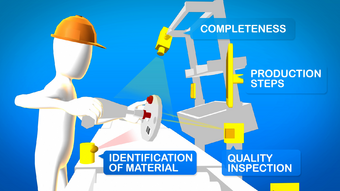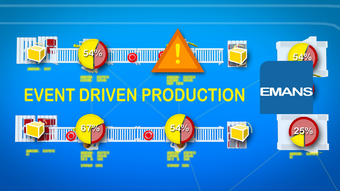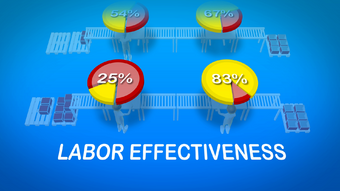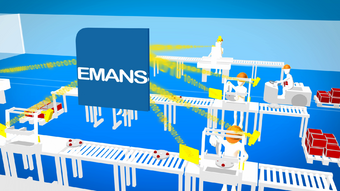3 Things Which Every Production Manager Wants to Improve
2015-06-29
Peter Bílik, Smart Industry solution designer, ANASOFT
The software support of the management of manufacturing operations can improve quality, productivity and effectiveness, but not in every company
Every manager in a factory is aware of the fact that it is increasingly difficult to find unique selling points and competitive advantages in the manufacturing industry. The same raw materials and machinery can be bought by everybody for approximately the same price. Recruiting and training people are not easy tasks, but even in this respect no great differences can be expected. And thus, operations remain the main source of competitive advantage. The idea that the best organized company is the best company has applied since the times of Henry Ford.
However, it is one thing to have operations well thought out and described on paper and another to ensure that they are systematically and thoroughly adhered to and on an ongoing basis. Many companies have fallen under the spell of Kaizen or other methodologies which promise gradual improvements in operations, working procedures, quality and effectiveness. But to operate in accordance with Kaizen is quite difficult over a long period of time and many companies give up or at least ease up on the principles of improvement.
The software support of manufacturing operations is the solution for the sustainability of innovations. Production lines and CNC machines, which are computer controlled, are usually the main topics of discussion regarding automation in the industrial sector. On the other hand, although the issue of software is rarely brought up, the deployment of a software system (MOM – Manufacturing Operations Management) that will connect several elements in manufacturing can bring distinctive benefits in terms of quality, productivity and effectiveness.
Quality
 The operations of a company which manufactures front-end modules for automobiles (i.e., everything between the engine and bumper) are extremely variable – thousands of variations of products are made based on dozens of criteria. Remembering all of the possibilities which come into consideration in assembling is almost impossible. Therefore, the workers in the factory need simple step-by-step visualization which shows them what to do.
The operations of a company which manufactures front-end modules for automobiles (i.e., everything between the engine and bumper) are extremely variable – thousands of variations of products are made based on dozens of criteria. Remembering all of the possibilities which come into consideration in assembling is almost impossible. Therefore, the workers in the factory need simple step-by-step visualization which shows them what to do.
The MOM system knows which module is being assembled and gives precise operating instructions to the workers via a display. It also acts as a control – sensors monitor various details, not only if all of the screws were fastened but also the degree of their fastening. The system will not allow a worker to continue if a given step has not been completed perfectly.
Result? One hundred percent production quality.
Productivity
 In a company that manufactures heat pumps, the managers needed to improve the measurement and evaluation of the productivity of individual workers. However they understood that the installation of a camera system, which fulfills only a supervisory function, would not do the trick.
In a company that manufactures heat pumps, the managers needed to improve the measurement and evaluation of the productivity of individual workers. However they understood that the installation of a camera system, which fulfills only a supervisory function, would not do the trick.
Instead, they chose a solution through which the worker records the beginning and end of individual operations, such as the installation of a cooling device. Based on this, managers can set norms, evaluate the productivity of individual workers and adjust remuneration accordingly.
A 15 percent increase in productivity is the main benefit for the company, but other benefits are also worth mentioning. For example, information on the length of time it takes to manufacture individual models of their products is at their disposal immediately. Thanks to this, managers can better plan manufacturing schedules. If they get an order for a model whose production is time consuming, they will know that this will engage the production line and prevent them from being able to produce and satisfy other orders. In addition, the identification of the birth certificates of individual products is no problem and positively affects quality.
Effectiveness
 A company manufacturing lights for automobiles needed to prevent the degradation of stored materials waiting for further processing. Molded plastic parts must mature in a warehouse for at least 48 hours, but not longer than 2 weeks because they will begin to degrade.
A company manufacturing lights for automobiles needed to prevent the degradation of stored materials waiting for further processing. Molded plastic parts must mature in a warehouse for at least 48 hours, but not longer than 2 weeks because they will begin to degrade.
In the past, a worker had to regularly check to see if there were any molded parts in the warehouse that needed to be processed. Now, a worker can see records concerning stocks in the computer – and know exactly what expires when and where it is situated in the warehouse, so that no further degradation occurs. Moreover, inventory taking is no longer needed since there is a clear picture of stocks available at any time.
A certain sub-supplier of car makers also improves logistics by using IT technology. It uses the approval of work operations by gestures (sensed by Kinect) when ensuring the screening of the receipt of parts from sub-suppliers, since due to the sensitive manipulation of products, the operation did not allow for the installation of additional touch-sensitive devices.
For whom MOM is not the right solution
 Software for supporting and optimizing manufacturing which enables the collection and sharing of information from various corners of the manufacturing plant enables managers to evaluate what is going on in their plant and change operations easily. Furthermore, if a company uses displays with the visualization of manufacturing operations on its production line, certain changes in production based on the requirements of the customer can be made within a few hours.
Software for supporting and optimizing manufacturing which enables the collection and sharing of information from various corners of the manufacturing plant enables managers to evaluate what is going on in their plant and change operations easily. Furthermore, if a company uses displays with the visualization of manufacturing operations on its production line, certain changes in production based on the requirements of the customer can be made within a few hours.
If changes relate only to adjusting a series of steps or in using different material, they can be set in the system. Thus, the workers in production receive instructions immediately, with no need for training in compliance with the new operation. One of the key features of the MOM system is that even regular users can make such changes without the need for additional programming.
Naturally, similar software support may not be useful for a refinery which makes almost no changes in its manufacturing program throughout the year and does not even manufacture various products. But a software system supporting and managing manufacturing operations is a necessity for a plant with multiple shifts, high variability of manufacturing and frequent changes in portfolio, i.e., with discrete manufacturing, especially if customers have high requirements regarding quality, which today is the rule rather than exception.







